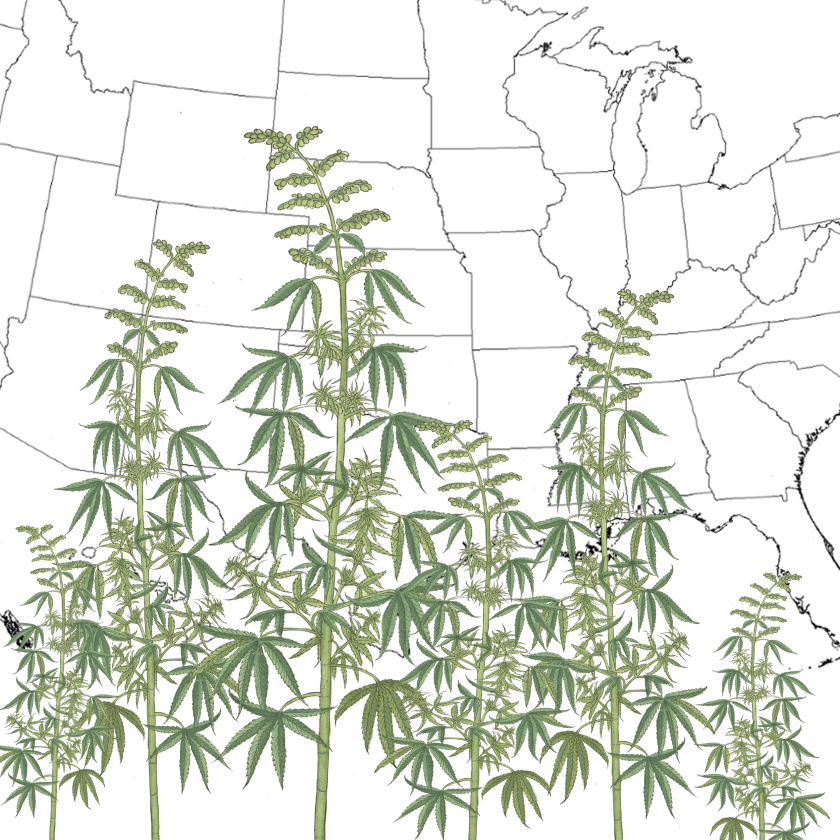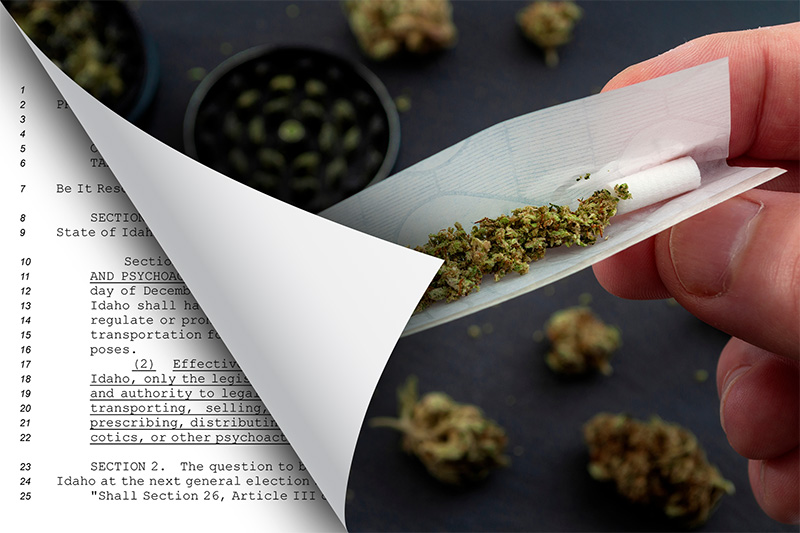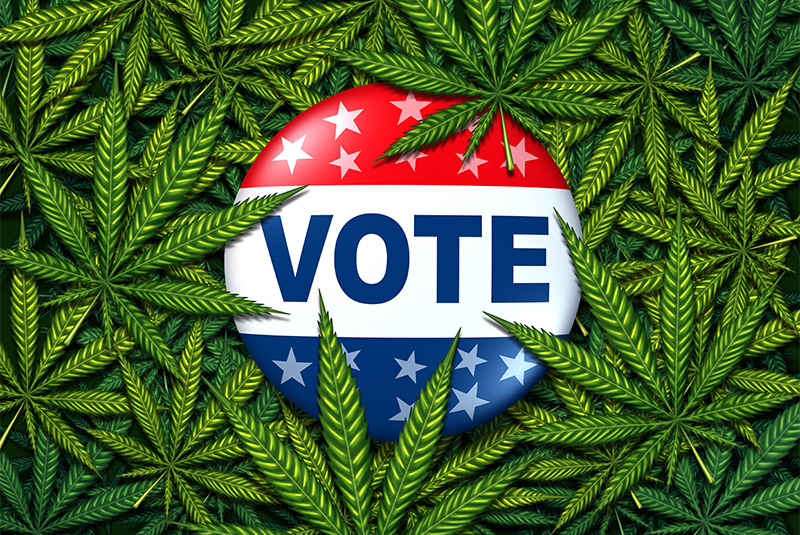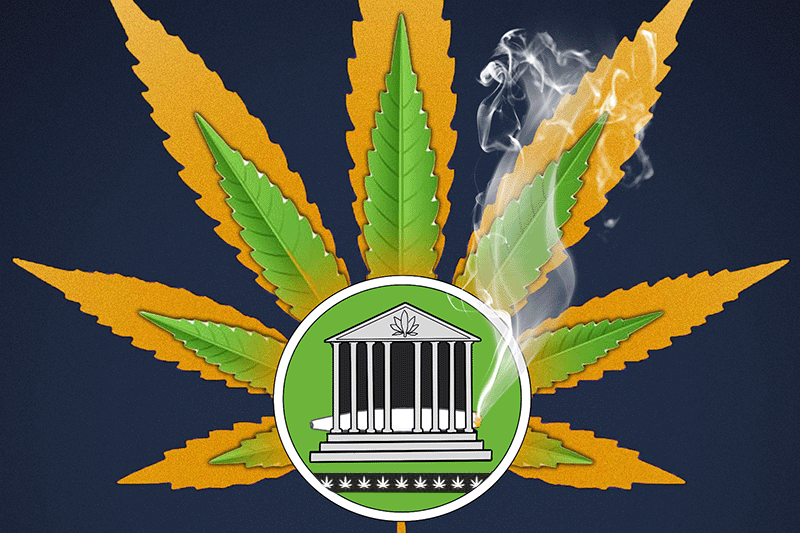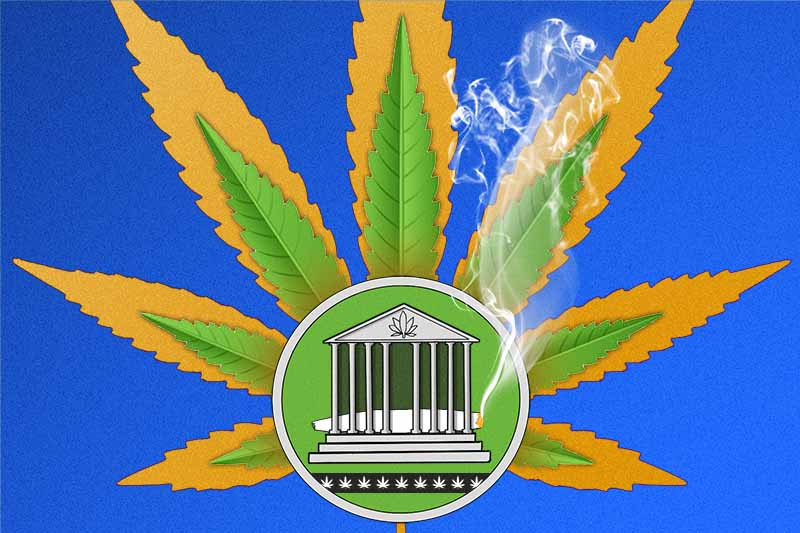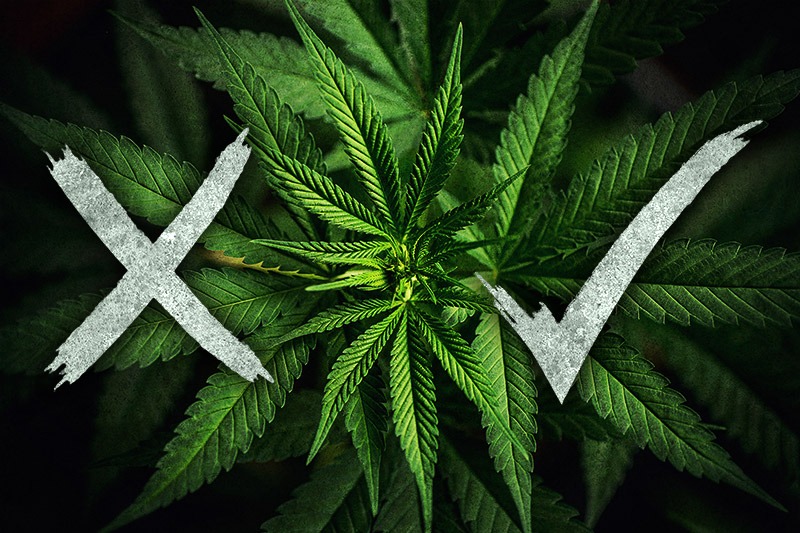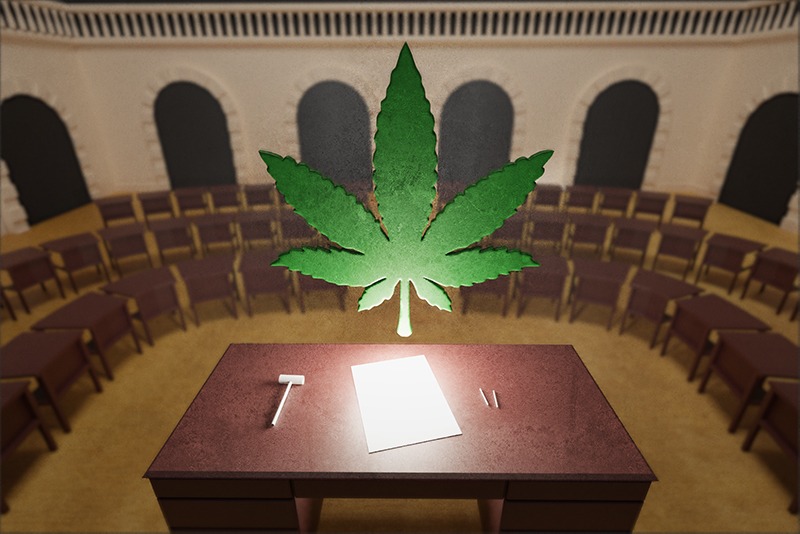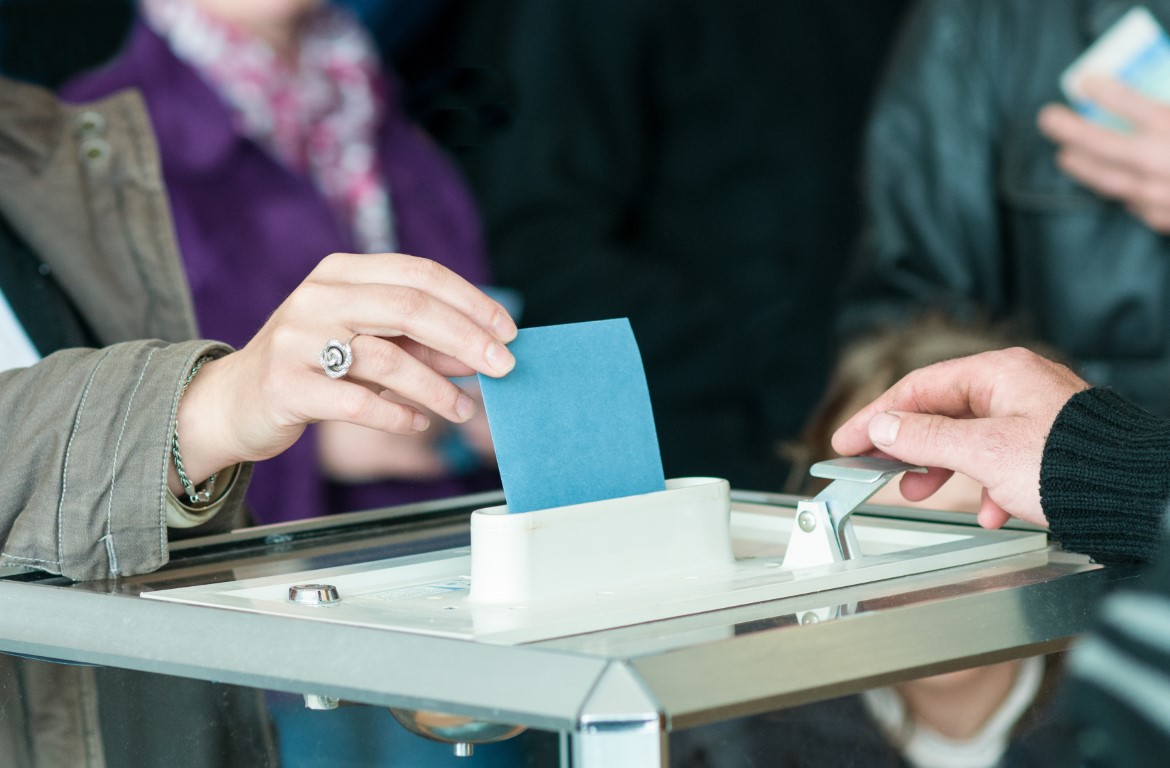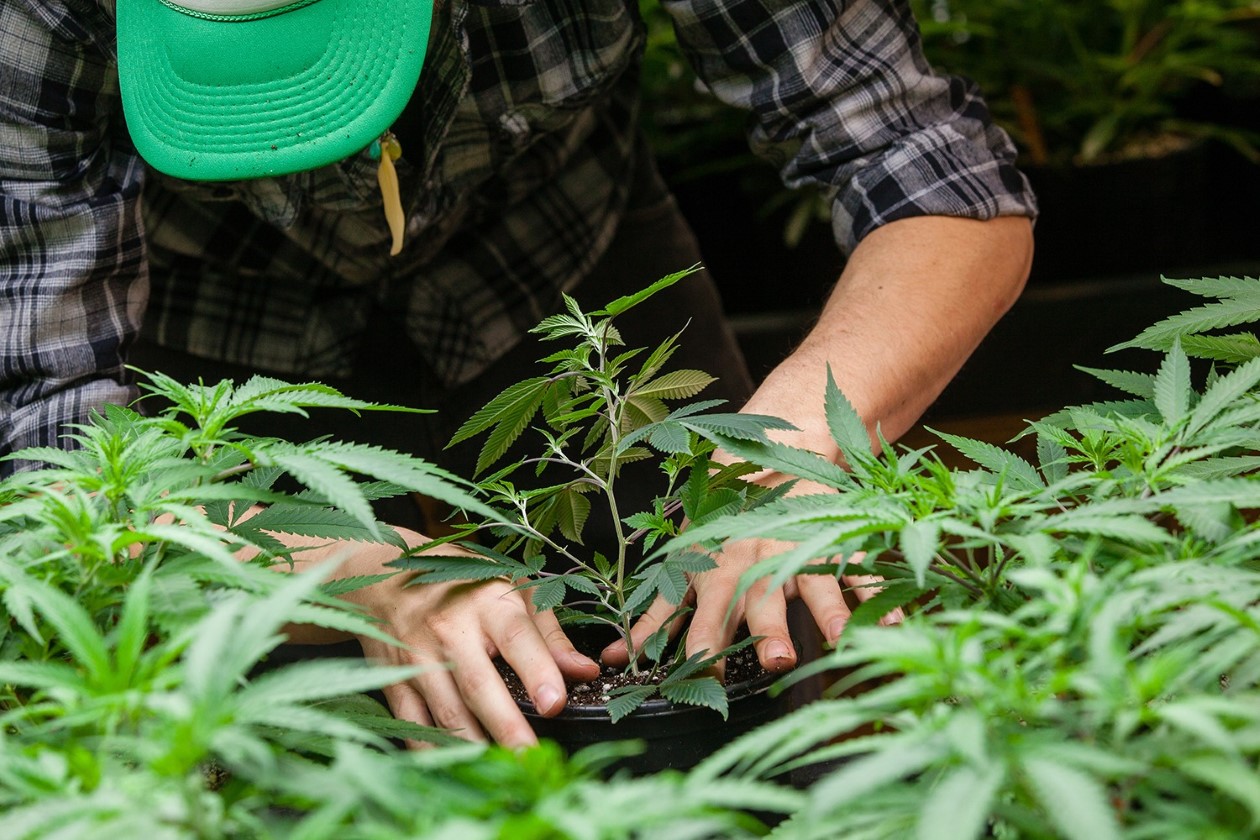In the Weeds
HOW STATES ARE LEGALIZING
marijuana in the shadow
of a federal prohibition
Introduction
Policymakers considering adult-use marijuana legalization are not doing so in a vacuum.
As of November 2023, 24 states and the District of Columbia have already been down this path. Their experiences implementing new laws can serve as a potential roadmap for other states considering legalization. To paraphrase US Supreme Court Justice Louis Brandeis, states can serve as “laboratories of democracy” that can inform legislation in other states.
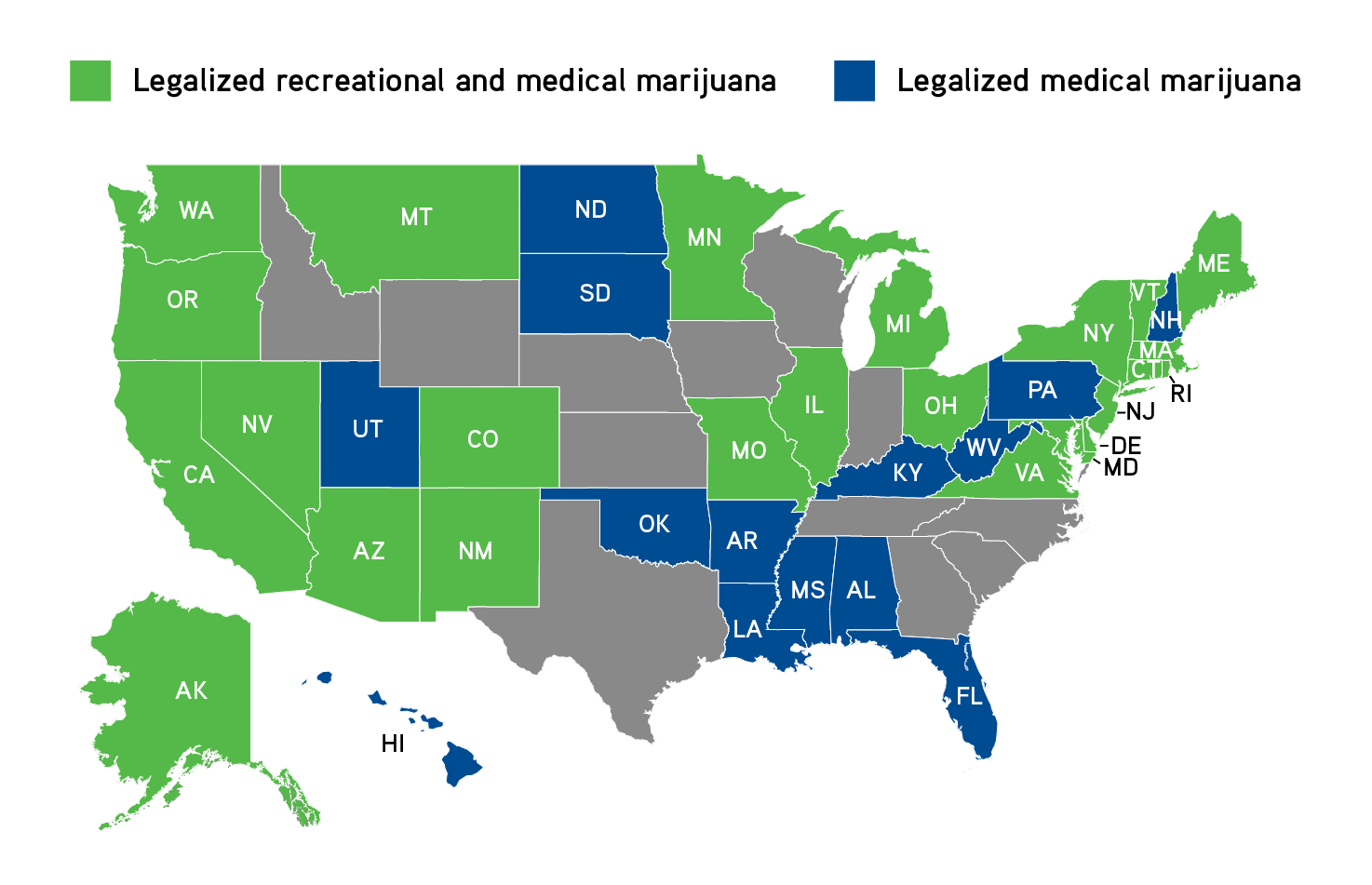
LISTEN
Rockefeller Institute researcher Heather Trela discusses the nuances of marijuana legalization on Policy Outsider, the podcast of the Rockefeller Institute of Government.
LISTEN
1. In the Weeds with Heather Trela
Clash of Laws
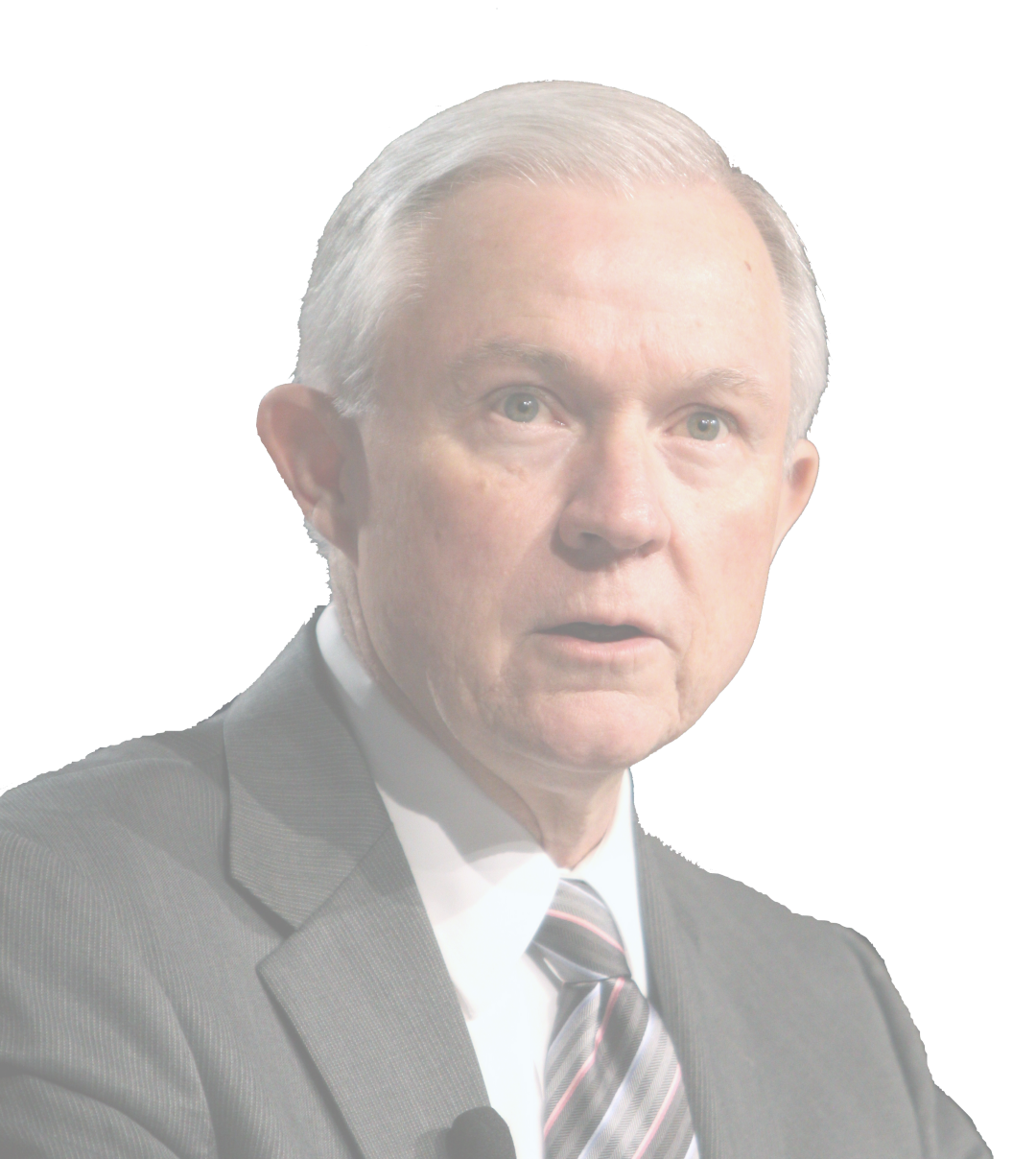
"I’m not sure we’re going to be a better, healthier nation if we have marijuana sold at every corner grocery store.”
— Former United States Attorney General Jeff Sessions
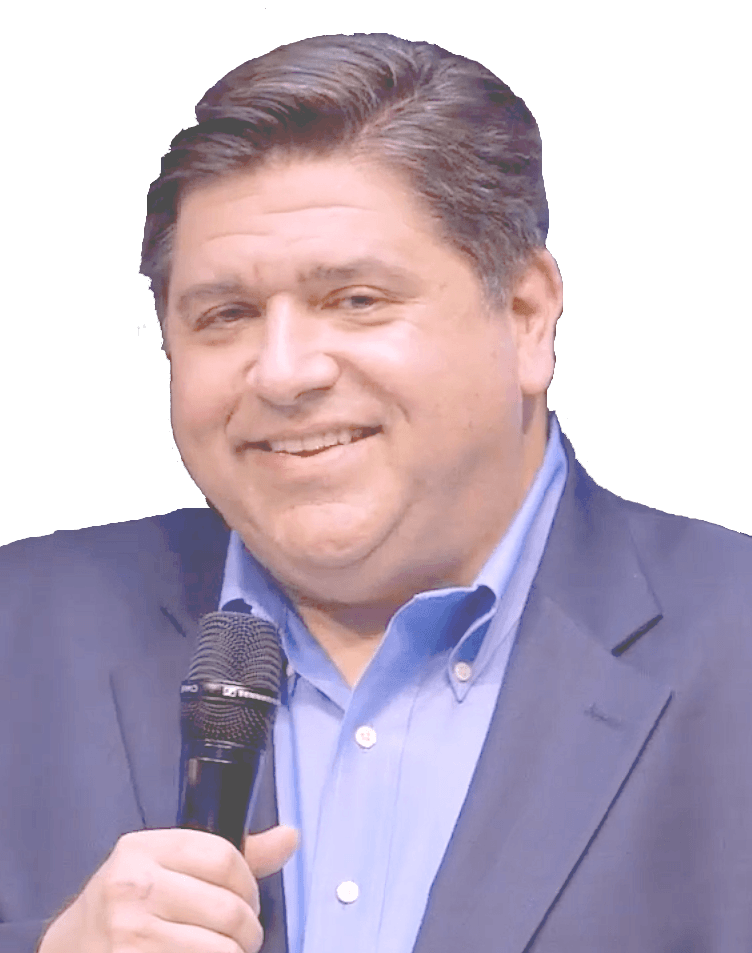
"I think we should take this action for our state because of the beneficial criminal and social justice implications and the jobs that it will create."
— Illinois Governor J.B. Pritzker
Marijuana remains illegal at the federal level as legalization spreads through the states, creating a complex clash of laws.
Until the early 20th century, marijuana was used in the United States in a variety of ways and was mostly unregulated. Early colonists were encouraged by Britain to grow hemp and the crop was used in the production of rope, paper, and cloth. Marijuana was also an ingredient in mainstream medicines as a treatment for a variety of ailments, including cholera, dysentery, alcoholism, opiate addiction, epilepsy, and asthma. The recreational smoking of marijuana was also introduced.
The first regulation of marijuana occurred with the 1906 Pure Food and Drug Act, which required that over-the-counter drugs containing cannabis had to be labeled. As marijuana use was tied to the 1910 influx of Mexican immigrants to the US, 29 states passed marijuana prohibitions. In 1937, Congress passed the Marihuana Tax Act to “impose an occupational excise tax upon certain dealers in marihuana, to pose a transfer tax upon certain dealings in marihuana, and to safeguard the revenue therefrom by registry and recording.” The act did not criminalize the drug, per se, but failure to pay said taxes or follow regulations was punishable by fines up to $2,000, up to five years in jail, or both. The Marihuana Tax Act stayed on the books until 1969 when the Supreme Court struck it down as a violation of the Fifth Amendment protection against self-incrimination in Leary v. United States.
After the Marihuana Tax Act was deemed unconstitutional, the Nixon administration encouraged Congress to create a new system for classifying drugs based on their medical utility and addictive potential. The result was the 1970 Controlled Substances Act, which established federal drug policy. Marijuana — like heroin and LSD — was classified as a Schedule I drug, meaning it has no currently accepted medical use and has a high potential for abuse. With this classification, marijuana became illegal under federal law.
In 1996, California became the first state to enact medical marijuana legislation with the Compassionate Use Act. In the next four years, Oregon, Alaska, Washington, Maine, Hawaii, Nevada, and Colorado followed suit. Colorado became the first state to legalize recreational marijuana in 2014. As of January 2020, 11 states and the District of Columbia have passed legislation permitting recreational marijuana and 33 states and the District of Columbia have some medical marijuana laws on the books.
Read the Series
In the Weeds
How are states legalizing a drug that's illegal under federal law? The Rockefeller Institute is studying legalized adult-use/recreational marijuana implementation, challenges, and economic impacts in New York and beyond. Read the findings and recommendations below.
A Long Wait >
Some states see recreational cannabis sales within months of legalization; others take years.
Adult-Use Marijuana Legalization to Sales: Three Factors that Impact Speed of Implementation (August 2025)
On August 1, 2025, Delaware became the latest state to open their adult-use cannabis market to sales. The 27 months it took to get to that first sale following adult-use legalization makes it the third-longest such wait between legalization and first legal sale. In this blog, Rockefeller Institute Director of Operations and Fellow Heather Trela introduces a new "legalization-to-sales" data tracker and highlights three factors that affect how long it takes to get the adult-use market started. Read More >
Tote or Toke 2 >
Disparate US Circuit Courts of Appeals interpretations of Bruen have led to a scenario where where you live shapes whether you can be a cannabis user and a legal gun owner.
Circuit Breaker—Judicial Disconnect on Disarming Cannabis Users (September 2025)
This week, the Supreme Court will decide which pending cases it will hear oral arguments for when its term begins on October 7. Among the options: cases on whether or not a cannabis user can legally own a firearm. The lack of uniformity in recent US Circuit Courts of Appeals rulings in a number of similar cases surrounding cannabis use and firearm ownership makes such cases a candidate for SCOTUS to remedy the "circuit split" and issue a single authoritative ruling. This blog explains the statutes at play, details the disparate rulings across different circuit courts, and illustrates how, in this moment, whether you can toke and tote comes down to where in the US you live. Read More >
Rolling Back State Cannabis Ballot Measures >
Cases in Ohio, Nebraska, and Idaho highlight a critical moment in the trajectory of cannabis policies across states: while public support continues to grow, institutional and political barriers remain strong.
Roll(back) Another Joint: The Undoing and Limiting of State Cannabis Ballot Measures (April 2025)
Cannabis legalization in the United States has made huge gains; in the decade since Colorado and Washington legalized adult-use cannabis in 2014, nearly half the states have followed suit. Many of these states legalized cannabis through the initiative process, where voters directly make decisions on policy proposals, rather than elected officials doing so as representatives of their constituents. However, recent actions by state legislatures and officials may be harbingers of change in the cannabis landscape, as there are efforts in multiple states aimed at rolling back voter-approved cannabis legalization measures or limiting the ability of voters to use the initiative process for cannabis legalization. Read More >
LISTEN
102. Re: Rescheduling
LISTEN
99. Buds on the Ballot
Buds on the Ballot >
The 2024 election provides a snapshot of many of the issues at play today in marijuana policy and puts voters front and center in making these decisions.
Buds on the Ballot—Marijuana and the 2024 Election (October 2024)
While November's election is dominated by the presidential race and control of Congress, there are significant marijuana policy issues on the ballot as well. At the federal level, Republican and Democratic presidential candidates Donald Trump and Kamala Harris have weighed in on rescheduling and federal legalization of marijuana. At the state level, several citizen-initiated ballot measures would legalize either recreational or medicinal marijuana (and in Oregon, a ballot measure will decide a cannabis labor issue). And at the local level, some municipalities may decriminalize marijuana in their jurisdictions while others opt out of marijuana retail sales. Read More >
Tote or Toke >
The Supreme Court ruling in Bruen opened the door for challenges to firearm restrictions, including the federal prohibition on cannabis users owning guns.
Tote or Toke? Considering the Intersection of Marijuana and Gun Policies (April 2024)
The 2022 Supreme Court ruling in Bruen opened the door for challenges to many firearm restrictions, including the federal prohibition on cannabis users owning guns. This analysis details three different federal court cases that found unconstitutional a section of the 1968 Gun Control Act which makes it illegal for users of controlled substances to possess a firearm. With one of these cases waiting for potential Supreme Court review and a decision expected in a different case (United States v Rahimi) that could clarify Bruen's historical test, Americans may soon no longer have to decide: tote or toke? Read More >
LISTEN
83: The State of New York's Marijuana Marketplace
LISTEN
78: Rescheduling Marijuana
High Courts II >
Legal challenges in Florida and New York are affecting adult-use legalization and rollout.
The High Courts II (September 2023)
Legal challenges continue to shape state marijuana markets. In Florida, where medical marijuana was legalized in 2016 through the initiative process, a legal challenge to a new initiative that would legalize adult-use marijuana jeopardizes the initiative's chance of appearing on the ballot in 2024. And in New York, an injunction resulting from a legal challenge to the state's Conditional Adult-Use Retail Dispensary (CAURD) licenses has frozen the ability of the state's Office of Cannabis Management (OCM) to issue new retail licenses and for some license-holders to open shops. Read More >
The Growing Role of the Courts >
New rulings are shaping marijuana markets.
The High Court: How the Judiciary is Influencing Marijuana Policy (April 2023)
As marijuana legalization spreads across the US and marijuana markets mature, the judicial branch is playing a larger role in shaping these markets. Of particular interest are courts' attitudes toward residency requirements for medical and retail dispensary licensing, interstate commerce, and, in New York, the implementation of the social equity program for licensing. This analysis examines the arguments in a number of key cases, the impact of court decisions on marijuana markets, and how, as concerns at least one oft-cited legal doctrine, a showdown at the Supreme Court may be inevitable. Read More >
Trends to Watch in NY in 2023 >
The first dispensaries are open in New York but there are still many unanswered questions.
What to Watch in New York’s Adult-Use Cannabis Retail Market (February 2023)
It’s poised to be a big year for marijuana in New York State. Shortly after licenses were awarded by the Office of Cannabis Management (OCM), the first adult-use dispensary in the state opened on December 29, 2022, in New York City, with additional retail following both downstate and upstate within weeks. As the retail market expands, the team at the Institute is keeping their eye on a number of developments. Here are five of the trends that we will be watching. Read More >
Municipal Opt-Out Tracker >
Delayed state guidance has had a direct effect on municipalities weighing whether or not to opt out of retail and on-site consumption lounges in their jurisdictions.
Marijuana Opt-Out Tracker (December 2021)
The end of the year brings a looming deadline for municipalities in New York State. When the Marijuana Regulation & Taxation Act (MRTA) legalized adult-use/recreational marijuana earlier this year, one of its provisions permitted towns, cities, and villages the opportunity to opt out of the state issuing licenses for marijuana dispensaries and/or on-site consumption lounges within their jurisdiction. The Marijuana Opt-Out Tracker is a regularly updated dashboard that allows users to view which municipalities have made the decision to opt out of adult-use marijuana dispensaries and/or on-site consumption lounges in their jurisdiction as the December 31st deadline approaches. View the Tracker >
To Opt In or Opt Out—That is the Question for NYS Municipalities (October 2021)
Final appointments to the Cannabis Control Board and the Office of Cannabis Management were not made until September 2021—six months after MRTA became law—and the Cannabis Control Board didn’t hold their first meeting until October 5, 2021. The delayed state guidance has had a direct effect on local government decision making. Read More >
Changing Legalization Mechanics >
The legislative process for legalization takes center stage as the initiative process faces challenges.
As Marijuana Grows More Mainstream, Mechanics of Legalization Change (August 2021)
The COVID-19 pandemic and resulting public health emergency caused massive disruption over the past 18 months—jobs were lost, events were cancelled, and people had little choice but to adapt to a virtual world as schools, governments, and offices transitioned to being at least partially, if not fully, remote. One policy that didn’t seem to be slowed down by the pandemic, however, was marijuana legalization. From July 1, 2020 to June 30, 2021, nine states legalized new programs for medical and adult-use/recreational marijuana—the largest number of states to legalize marijuana during any comparable year to date. Read More >
LISTEN
37: It's Legal | In the Weeds Pt. IV
Marijuana and Magic Mushrooms >
A look at similarities between recent efforts to decriminalize magic mushrooms and the legalization push for marijuana.
Has Marijuana Provided a Blueprint for Magic Mushrooms? (October 2020)
On Election Day 2020, voters in the District of Columbia and Oregon will get to decide ballot initiatives about the decriminalization of psilocybin mushrooms (more commonly referred to as magic mushrooms). If these ballot measures are passed, Washington D.C. and Oregon will follow Ann Arbor, Denver, Oakland, and Santa Cruz in decriminalizing magic mushrooms. In doing so, efforts to decriminalize the fungus exhibit similarities to early marijuana legalization efforts: an initial focus on decriminalization—often at the city level—followed up by legalization pushes that emphasize the documented medicinal benefits of the drug. Read More >
LISTEN
34: Drugs on the Ballot
Legalization Hits a Stumbling Block >
Adult-use legalization efforts recently stalled in New York and New Jersey, despite apparent public support. We examine why.
Why Is It So Hard to Pass Marijuana Policy Legislatively? (May 2019)
Of the 10 states that permit adult-use marijuana, only Vermont did so through the legislative process — permitting home cultivation of a small number of marijuana plants, but failing to tackle the more complex issue of creating a commercial market for retail sales. The other nine states have implemented adult-use through the initiative process, which allows citizens to propose a new statute to be approved directly by voters and circumvent the legislature. Why have efforts to pass adult-use marijuana stalled legislatively while they have achieved better success through ballot measures? Read More >
The Economics of Legal Marijuana >
A $1.7 billion adult-use marijuana industry in New York could generate a total economic output of $4.1 billion and total employment of 30,700.
The Economic Impact of Developing the Adult-Use Cannabis Industry in New York (April 2019)
One of the most effective arguments for the legalization of marijuana is the economic opportunity it would create for New York State and its residents. Previous studies have found that 63.4 percent of surveyed adults agree that the creation of the industry and corresponding jobs would be a justification for legalization. The legalization of marijuana provides an interesting case study and natural experiment in the field of economic development. It is rare that new industries and supply chains must be created in such a short time frame. Read More >
A ROADMAP FOR POLICYMAKERS >
State policymakers considering marijuana legalization and implementation should answer these questions first.
Six Issues States Need to Consider (March 2019)
The 10 states that have implemented legalized adult-use marijuana are operating in the somewhat uncertain context of regulating a practice that is illegal at the federal level. Presumably, no state wants to do anything that brings the attention — and enforcement — of the federal government, so there is added pressure on implementation decisions. No matter how states ultimately choose to adopt and implement adult-use marijuana, however, there are some common questions that states should consider, drawing from the experiences of the states that have gone before them. Read More >
LISTEN
8: A Gateway Drug for Federalism
Marijuana & the Opioid Crisis >
Emerging data indicate that marijuana can play an important role as a less-addictive alternative to opiates.
Can Marijuana Alleviate the Opioid Crisis? Data Suggest Yes (May 2018)
The damage from opioid abuse is not limited to individual users, but has ripple effects that impact families, communities, and governments. Policymakers and activists are grappling with how to best address the problem, but are often stymied by budget constraints and a lack of evidence as to what actually works. Recent research, however, has found that legal access to marijuana may be a potential tool for addressing the opioid crisis. Read More >
Chaos in the States? >
The Cole memo protected states that had legalized marijuana from federal prosecution — until it was rescinded last year.
Attorney General Sessions Makes Move against State-Legalized Marijuana (January 2018)
The laissez-faire approach codified by the Cole memo allowed the legalization of both medical and recreational marijuana in the states to grow without being challenged by the federal government. By abandoning it, former Attorney General Sessions gave US attorneys the freedom to begin prosecuting people who violate the federal prohibition on marijuana, regardless of state law. Read More >
Medical Marijuana Protections >
As Congress faces its deadline to pass a spending plan, lawmakers will also have to decide whether to renew an amendment that prohibits the Department of Justice from using federal funds to interfere with state laws that legalize medical marijuana.
State Medicinal Marijuana Protections Hang in the Balance (December 2017)
The Rohrabacher-Blumenauer Amendment prohibits the Department of Justice from using federal funds to interfere with the implementation of state laws that legalize medical marijuana. As Congress faces its deadline to pass a spending plan, lawmakers will also have to decide whether to renew the amendment or to let it sunset, potentially opening the industry to federal prosecution in the 29 states where medical marijuana has been legalized. Read More >
Civil Asset Forfeiture >
Marijuana dispensaries could be particularly vulnerable to federal civil asset forfeiture, as the drug is classified as illegal by the federal government despite legalization in many states.
Legalized Theft or Necessary Law Enforcement Tool? (November 2017)
In July 2017, Attorney General Jeff Sessions announced that the Justice Department would allow federal agency forfeiture, also known as “federal adoptions” of assets seized by state and local law enforcement agencies. The practice, an expansion of civil asset forfeiture, was curtailed by the Obama administration in 2015 by then-Attorney General Eric Holder. Though civil asset forfeiture is not necessarily well-known to the public, the practice is unpopular across the political spectrum. Read More >
Federal and State Power Showdown >
The Rohrabacher-Blumenauer amendment prevents the federal government from committing funds to interfere with the implementation of legalized medical marijuana in the states — but it must be renewed each year.
House Blocks Amendment to Protect Medical Marijuana in the States (August 2017)
Without the Rohrabacher-Blumenauer amendment, the Department of Justice is free to invest resources in prosecuting dispensaries and medical marijuana users for violations of federal law. States, meanwhile, are not walking away from the continued expansion of legalized marijuana despite the potential uncertainty. Read More >
Rhetoric and Resources >
Trump administration officials have signaled they intend to rigorously enforce federal laws related to marijuana but limited Department of Justice resources and large marijuana tax revenues for states may discourage them from doing so.
When State and Federal Laws Clash: The Possible Showdown Over Marijuana Laws (April 2017)
During the presidential campaign, candidate Trump indicated that marijuana usage was an issue best left to the states, but Trump administration officials have given indications that they intend to rigorously enforce federal laws. Resources, rather than rhetoric, may ultimately decide if the Trump administration follows the lead of the 2013 Cole memo, which deprioritized enforcement of federal law related to marijuana, or is more aggressive in enforcement. Read More >
The Researchers

Heather Trela is director of operations and fellow at the Rockefeller Institute of Government. Her research focuses on federalism issues with an emphasis on marijuana policy. She was a doctoral candidate at, and holds a master’s degree in political science from, the Rockefeller College of Public Affairs and Policy as well as a bachelor’s in economics and political science from Hartwick College.
Get in touch
